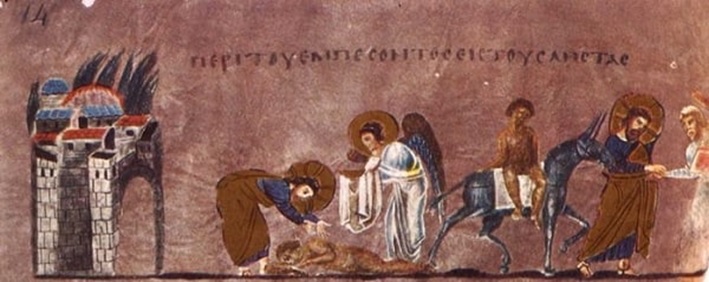Are there limits to human kindness? (8th Sunday of Luke)
13 November 2022It’s right and proper, if you’re in a hurry to get to work, to your office, or to go about your business that you should stop on the way and help somebody in need, even though you risk being late, losing out on something or even getting into trouble. Organization and the pace of life, a schedule and a variety of obligations often interfere with feelings of love and make it difficult for us to implement them. We speak of love as the most central feature of Christianity, but we forget that it is, or, rather ought to be, the most important characteristic of our own Christian life. So, while we often fail to show love to those who are in need of it, we always have a handy excuse ready for ourselves.

The parable of the Good Samaritan reminds us of some painful truths and provides us with an image of practical love. Contrary to what one might expect, while they’re making their way along the road from Jerusalem to Jericho a priest and a Levite ‘pass by’ the wounded, half-dead wayfarer who had fallen among robbers. Why do you suppose they didn’t stop? Perhaps they feared that they’d suffer the same fate if they delayed their journey. It’s a well-observed fact that fear of personal injury and the need for self-protection inevitably interfere with the work of love. Perhaps they were in a hurry to fulfill their obligations, to attend to some clerical duty, some mission. It’s true that often pious and entirely justifiable excuses are an obstacle which prevents us from assisting someone in immediate need. Perhaps they thought the man was actually dead and wanted to avoid contact with him, thus observing the relevant law of Moses. Very often, form supersedes substance and quells a spontaneous response. Or perhaps they were simply indifferent, for no good reason. We have plenty of inhumane examples nowadays of such toxic indifference.
The parable offers no explanation for the behavior of the two clerics. It’s more interested in the attitude of the third person in the narrative, the Samaritan, a man who, for the Jews, was unclean, a heretic to be rejected. We shouldn’t think that Christ wished to show the difference between the uncaring clerics of his day and the sympathetic ordinary people. His aim was something else: to demonstrate that although, in their daily prayers, the Jews recited the two basic commandments of the Old Testament (‘You shall love the Lord your God’ and ‘You shall love your neighbor as yourself’), in practice they had no inclination to apply them, whereas the foreigner gave an example of real religious sentiment, centered on an action of love. We would do well to look at some striking aspects of this love.

1. Love is a personal encounter with someone who’s suffering, who’s poor or unhappy. This personal encounter may mean loss of valuable time, neglect of private matters, the postponement of a trip or surrendering certain things which by rights belong to us. The kind-hearted Samaritan in the parable gave up his means of transport in order for it to carry the wounded man; he gave him his most valued supplies, oil and wine; he paid the inn-keeper; and promised, on his return to continue show interest in the man’s condition.
2. Love doesn’t come from some sudden flash of sympathy for the unfortunate person, perhaps inspired by the secret fear that we might one day find ourselves in the same situation; or the subconscious gratitude that we haven’t yet been in such a situation. It’s an unselfish and total act of giving, after the model of Christ who showed on the Cross what absolute love is. We love because ‘He first loved us’ (1 Jn. 4, 19), according to the phrase of the disciple of love.
3. But there’s another feature of love which emerges from the attitude of the Samaritan. Love knows no bounds or restrictions. It may have been this in particular that the Lord had in mind in the narration of this parable, which arose from a question from a Jewish teacher of the Law: ‘Who is my neighbor?’. He asked from within the chaos of differing concepts at his time concerning the meaning and boundaries of the term ‘neighbor’. Who was a proper object of love and how far should it extend? In telling this parable, Christ reverses things, by showing who is the subject of love. Each person is the subject of love and the limits of ‘neighbor’ are boundless, there are no social, religious, racial nor any other kinds of barriers. If you love only your friends, your co-religionists, your kith and kin, then you’re acting inhumanely. People who don’t recognize these barriers act in a Godly manner, in accordance with the model of the God of love.






